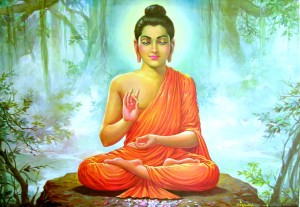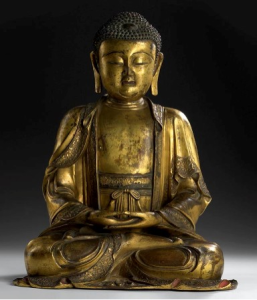UNDERSTANDING BUDDHISM
*Gautama Buddha*

Buddha was born Siddhattha Gautama around 565 B.C. in Lumbini (a town situated in modern Nepal, near the Indian border). The title Buddha means, Enlightened One or Awakened One. His descendant name, Gautama means of whose aims are achieved/who is efficacious in achieving aims. He became known as the Buddha (Enlightened One or Awakened One) at the age of 35. He is also commonly known as ‘Shakyamuni’ or ‘Sakyamuni’ (The sage of the Shakya clan) and as the Tathagata (thus come or thus gone).
Few of the details of the Buddha’s life can be independently verified, and it is difficult to determine what is history and what is myth.
According to most Buddhist traditions, Siddhattha Gautama, the future Buddha lived many lives before coming to our present world era. In his many existences during the long, long period of time and in the one hundred thousand worlds, the future Buddha had fulfilled the Ten Paramitas, and, in order to save this world, he was to be born in our era and to become a fully enlightened Buddha. Very Christ like, don’t you think?
****Not to be confused with Budai (the laughing fat Chinese Buddha). I can’t express enough how different the two are. The latter is a Chinese folkloric deity (he’s like what Santa Claus is in American Culture). ****
*Laughing Buddha*

BUDDHISM IN CHINA
Buddhism was introduced from India into China in 6th Century AD. One of the Hen Emperors sent a mission to the west of China and brought back the scriptures, Indian monks and the images of Buddha. Since then, Chinese translation was made available and the further exchange of scholars among China, India and other Asian countries brought about the rapid development of Buddhism in China. Buddhist monasteries and temples were built to promote the Buddhism and some of the Emperors were also the followers of Buddhism. Buddhism, just like Confucianism and Taoism, guides people to behave, to be honest and responsible. It promotes harmony and peaceful mind, sharing and compassion. Buddhists never force people into their belief. Buddhism emphasizes in “awakening of mind”. Through learning, one will develop intellectual capacity to the fullest so as to understand, to love and be kind to other beings.
Buddhism does not believe in God. It believes in People. In Buddhist teaching, there is no aggressive promotion of Buddhism or strong rejection of other religions. All these make Buddhism fall into the same scope of Confucianism and Taoist. Its ability to co-exist with any other religions makes it being developed into one of the largest religions in China.
